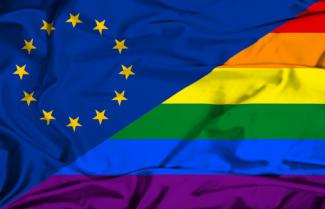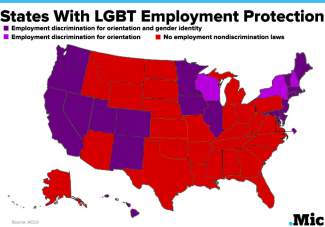Did the Ukraine just put its joining the European Union (EU) oh hold over not wanting to protect its citizens from being fired because of their sexual orientation? After several warnings from the EU, it seems Ukraine did just that.
Even after the European Union reminded Ukraine that a visa-free regime would depend on the adoption of certain human rights bills, Ukraine’s parliament on Nov. 5 failed to pass a landmark bill on discrimination – a move that activists say may scare Europe off for years to come.
European Commission chief Jean-Claude Juncker spelled it all out for President Petro Poroshenko very clearly in a letter on Nov. 5. He reminded the Ukrainian president that there were certain prerequisites for approval of a visa-free regime with the EU: namely anti-corruption reforms and the adoption of legislation to prohibit discrimination in the work place on the basis of sexual orientation.
Far from being seen as a beacon of human rights victories, Ukraine has long struggled with a stigma against homosexuals, and the most recent gay rights protest over the summer ended in violence and bloodshed after homophobes attacked the march.
The attack was a stark reminder of the Soviet Union’s imprint on Ukraine. Homosexuality was a criminal offense in the USSR, and even after its collapse, “archaic” takes on the issue have maintained a tight grip on large portions of society, as the publicist and commentator Vitaly Portnikov said. The EU’s encouragement to change the Labor Code was a way to shed that skin and move closer to European norms.
The anti-discrimination bill submitted to parliament was prescribed in the EU-Ukraine Action Plan on visa liberalization. Not only did the legislation lay out protections for homosexuals; it also prohibited discrimination on the basis of skin color and religious belief.
But with a suspiciously large number of lawmakers absent during the vote and many abstentions, the bill failed to pass, with a mere 117 votes out of the required 226.
Political consultant Taras Beresovets said that even liberal lawmakers voted against, fearing that homophobic sentiment among voters might hurt their support.
Some lawmakers cited “Christian” or “conservative” values for their reluctance to vote for the anti-discrimination amendment to the Labor Code. Some argued that approval of the bill would lead to the legalization of gay marriage – a claim that drew indignation from gay rights and human rights activists.
“Lawmakers chose homophobia over a visa-free regime,” said Bogdan Globa, an activist and aide to the head of the parliament’s committee on human rights.
While he was not surprised by the decision, Globa said, he was “shocked by the level of deceit and manipulation” in lawmakers’ arguments.
“When they explained their votes against, they said that the bill could lead to legalization of gay marriages. Yet this anti-discrimination norm is part of the Labor Code, it’s in an entirely different sphere,” he said.
“We’ve really (wasted) our chance of a visa-free regime, because it would be impossible to adopt a new Labor Code now, over such a short period of time,” he told the Kyiv Post.
Zoryan Kis of Amnesty International Ukraine agreed that parliament’s decision would likely prove detrimental to the visa-free regime.
“This was one of the simplest tasks to fulfill (in the action plan from the EU). It wasn’t hurting somebody’s corrupt interests or providing biometric passports, all it required was that lawmakers vote for this one bill. It was so easy. And yet they couldn’t do it because of their own fear,” Kis said.
According to him, the bill’s rejection was not just a sign of homophobia among lawmakers, but also of a lingering Soviet mentality.
The European Union had set requirements for Ukraine as far back as 2010, years before the EuroMaidan Revolution and subsequent war with Russia that turned the country’s economy upside down. But the amendments had taken on new importance in light of Ukraine’s determination to move closer to the EU.
There was resistance to the bill from the get-go, however, with some lawmakers having asked the EU in September 2013 to waive the anti-discrimination requirement.
…
David Stulik, a spokesperson for the EU in Kyiv, told the Kyiv Post that the recommendations for Kyiv had been very “clear” in the action plan, hinting that the bill’s rejection could jeopardize visa-free regime plans. – kyivpost.com
We should not be quick to judge Ukraine for we don't even have such laws protecting our citizens here in the United States. Red, once again, is not a good political color.
Where do they go next? If the EU stated human rights laws need to be passed, does the Ukraine slip even further toward Russia?



